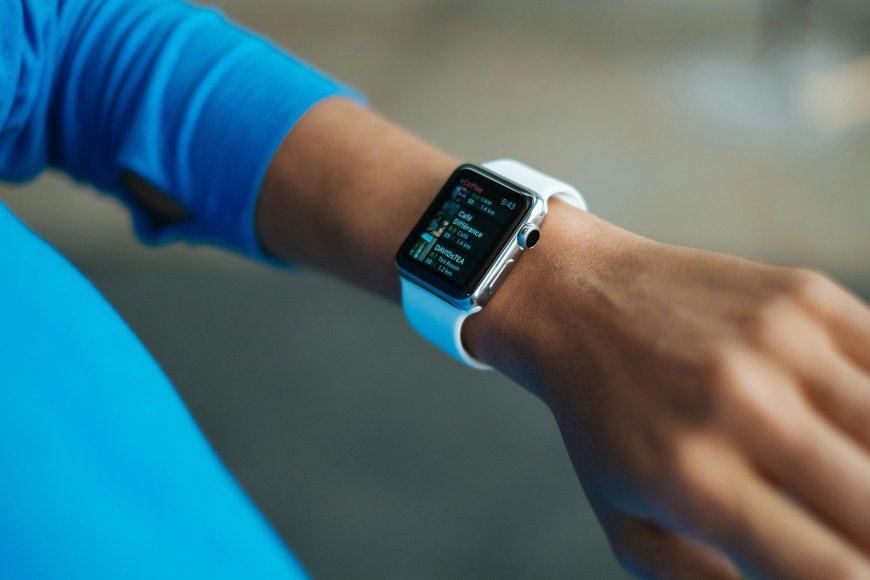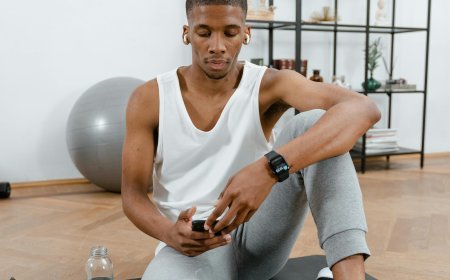How Well Does Your Fitness Tracker Really Know You?
Fitness trackers promise deep health insights—but how accurate are they really? We explore the truth behind wearables and what they reveal.

Nikki Gooding didn’t know what was happening, but something was off.
In early December, the 27-year-old aesthetic nurse practitioner started feeling uncharacteristically drained. Despite getting full nights of sleep, she was exhausted. Her appetite—normally robust—vanished. At night, she woke up sweating, as if trapped in an invisible fever.
But while Nikki brushed off her symptoms as stress or perhaps a winter bug, her Oura Ring told a different story. The device began reporting a steady increase in her basal body temperature, far beyond the minor fluctuations she’d grown used to. Daily notifications warned her of “major strain” on her body.
What Nikki didn’t realize at the time was that her fitness tracker had noticed her health changing days before she did. Weeks later, after medical testing, she was diagnosed with an infection that explained her mysterious fatigue. Her story raises a timely question: how well do these trackers really know us—and how much should we trust them?
The Rise of Fitness Trackers and Wearable Health
From Fitbit and Apple Watch to specialized devices like Whoop and Oura, wearable health trackers have become mainstream companions for millions.
They promise more than just step counts. Modern trackers measure:
- Heart rate and heart rate variability (HRV)
- Sleep cycles and quality
- Blood oxygen levels
- Stress and recovery patterns
- Skin temperature and respiratory rate
For many, these devices act as digital mirrors, offering insights into health, performance, and lifestyle. In the U.S., UK, Canada, and Australia, adoption has surged, particularly after the pandemic, when people sought tools to better understand their bodies.
But here’s the catch: while trackers offer streams of data, their accuracy—and their ability to truly “know” you—is still hotly debated.
What Fitness Trackers Get Right
Despite limitations, wearables have proved remarkably helpful in several areas.
- Activity tracking: Step counts and general movement data are reliable, giving a clear picture of sedentary vs. active days.
- Heart rate monitoring: Optical sensors perform well for resting and steady-state activity, though less so during high-intensity workouts.
- Sleep consistency: While they can’t perfectly identify sleep stages, trackers do accurately reflect sleep duration and general quality trends.
- Illness detection: As Nikki’s case shows, devices that monitor temperature and HRV can sometimes flag illness before symptoms are noticeable.
This predictive quality is one reason doctors and researchers are beginning to take wearables more seriously. Some studies suggest that changes in resting heart rate, skin temperature, or oxygen saturation can serve as early markers of infections or even chronic conditions.

Where Fitness Trackers Fall Short
Still, there are blind spots.
- Sleep staging accuracy: Most wearables rely on movement and heart rate to guess whether you’re in REM, deep, or light sleep. Compared to clinical polysomnography, results can be misleading.
- Calorie tracking: Estimates of calories burned are often off by 20–50%. For people trying to lose weight, this gap can distort expectations.
- High-intensity exercise: Heart rate monitors struggle during rapid movements, such as sprinting or interval training, where accuracy dips significantly.
- Context blindness: A tracker may flag high heart rate as “stress” without recognizing it’s from excitement, caffeine, or even watching a thriller on Netflix.
In other words, wearables offer valuable signals—but they are not diagnostic tools.
Storytelling: When the Numbers Don’t Match How You Feel
Tom, a 42-year-old software engineer in Toronto, swears by his Garmin watch. It helps him pace marathon training, warns him when recovery is slipping, and nudges him toward better sleep.
But one morning, after logging a nine-mile run, Tom’s tracker labeled his “training load” as “unproductive.” He felt strong, energized, and confident—yet the data told him otherwise.
“It almost got in my head,” he recalls. “I wondered, am I really that out of shape? Or is this thing just guessing wrong?”
Tom’s experience highlights the emotional weight of numbers on our wrists. When a device suggests something negative, it can undermine our intuition—even if we feel fine. This tension underscores why experts urge users to treat trackers as guides, not gospel.
The Psychology of Being Measured
Beyond health insights, trackers shape behavior in powerful ways.
- Positive motivation: Many people walk more, sleep longer, or hydrate better when prompted by their device.
- Negative obsession: For others, the constant data can fuel anxiety, perfectionism, or unhealthy comparisons.
- Identity reinforcement: Some users report feeling “seen” by their device, as if it validates their effort and lifestyle choices.
Psychologists warn that while self-tracking can be empowering, it risks creating a dependency on numbers instead of self-awareness.
The Future of Personalized Tracking
Citi’s bullishness on Snowflake may revolve around cloud data, but in the world of wearables, personal data is the real currency. Companies are racing to integrate:
- Continuous glucose monitoring (CGM) for real-time insights into blood sugar.
- Blood pressure and hydration sensors embedded in wristbands.
- Advanced AI algorithms that could predict health risks with greater accuracy.
- Integration with healthcare providers, turning trackers into tools that feed directly into medical records.
This evolution promises deeper personalization—but also raises questions about privacy. How much of your biometric data are you willing to share? And who ultimately controls it?
What This Means for You
If you’re one of the millions using a fitness tracker daily, here are practical takeaways:
- Trust trends, not single readings. One night of “bad sleep” on your app doesn’t define your health.
- Use trackers as guides. Let them highlight patterns, but don’t ignore your own feelings and intuition.
- Watch for meaningful changes. Consistent shifts in heart rate, temperature, or recovery scores may justify closer attention—or even a doctor’s visit.
- Avoid obsession. Remember, health is more than numbers. Quality of life matters just as much as quantified metrics.
Conclusion: A Mirror, Not a Crystal Ball
Fitness trackers have come a long way from simple pedometers. They offer valuable glimpses into our daily rhythms, sometimes even catching health changes before we can name them. But they are not crystal balls.
The truth is, your fitness tracker knows a lot about you—but it doesn’t know everything. The best results come when you combine its data with your own awareness, professional medical advice, and, occasionally, the courage to trust your gut.
In the end, the most accurate health tracker is still you.
FAQs
1. Can a fitness tracker detect illness?
Yes, some devices can flag changes in temperature, heart rate, or recovery that may indicate illness—but they cannot diagnose.
2. How accurate are fitness trackers for sleep?
They are fairly good at tracking sleep duration but less reliable at identifying sleep stages.
3. Do trackers overestimate calories burned?
Often, yes. Many devices can be off by 20–50% in calorie burn estimates.
4. Should I rely on my tracker more than my doctor?
No. Trackers are guides, not medical tools. Always consult a professional for health concerns.
5. Are wearables safe for long-term use?
Yes, most are safe, but users should remain mindful of privacy and avoid becoming overly dependent on daily metrics.
What's Your Reaction?
 Like
1
Like
1
 Dislike
0
Dislike
0
 Love
0
Love
0
 Funny
0
Funny
0
 Angry
0
Angry
0
 Sad
0
Sad
0
 Wow
0
Wow
0



































































